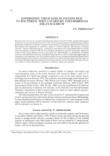Bacterial wilt or brown rot, caused by Pseudomonas solanacearum E.F. Smith, severely limits potato production in warm growing areas of the world. Accurate quantification of yield loss has not been determined. Subjective estimates of losses at international, national and regional levels have been determined from statements of authority, postal or on-farm inquiries and surveys of disease intensity. Specific field experiments, conducted in inoculated and uninoculated soils for several sites and seasons, would provide the more detailed information required to generate regression models which relate disease intensity and yield loss. Methodology for assessment of disease intensity and marketable yield may be adapted from procedures used to screen potato genotypes for resistances to the diseases in the field. Analysis of data from screening experiments indicated linear relationships between yield loss and disease intensity as well as between plant wilt and tuber rot intensities. Multiple regression analysis showed that yield loss per unit increase of disease intensity was similar in three experiments conducted in different years and countries.

